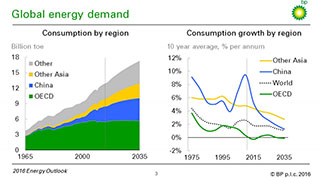The world demand for energy consumption will increase by 34% between now and 2035, according to oil giant BP. It’s hard to get one’s head around that while the oil and gas industry is mired in one of its worst slumps in decades.
“The situation that the industry finds itself in now is different than in the past,” said Allan Pulsipher, Marathon professor of energy policy at the LSU Center for Energy Studies. “You have U.S. inshore production, Iran coming back into the market and Iraq stumbling toward producing as much as it used to.”
Pulsipher said demand is just not there right now and that technology is having a negative effect, as far as consumption is concerned, on energy needs as opposed to demands of the past. “We have improvement in efficiencies. It is now common for us to drive cars that get 25 miles to the gallon,” he said. “Demand just isn’t growing. China has the two children per household rule. There’s also been an increase in technology in the developing world.”
Yet the research professor said a glacial change will come, eventually. “It’s certainly possible to maintain the price between $50 and $75 a barrel in four to five years,” said Pulsipher. “I don’t see much on the horizon until then.”
Mark Finley, BP’s chief U.S. economist told those in attendance at the Center for Energy Studies’ recent “Energy Outlook 2035: The Global Energy Industry and Its Impact on Louisiana,” that “global economic growth drives energy demand” and BP sees the world’s GDP more than doubling over the next 20 years.
BP’s Outlook to 2035 has energy consumption increasing by 34%, with fossil fuels expected to provide about 60% of the increase in energy. The oil market will gradually rebalance, with consumption of liquid fuels driven by the increase in the number of vehicles in the world, from about 1.2 billion today to 2.4 billion by 2035. Gas, which is currently the fastest growing fossil fuel, will see a gradual increase, the oil giant said.
“Global demand for energy continues to rise [between now and 2035] to power increased levels of activity as the world economy continues to grow,” said Finley. “Fuel mix changes significantly with coal losing, renewables gaining and oil and gas combined holding steady.”




